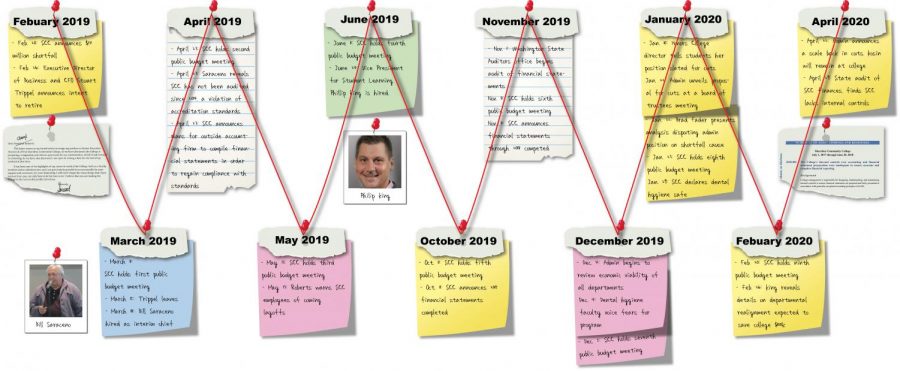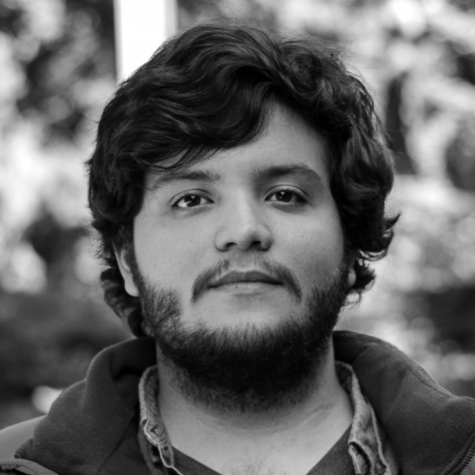Financial Problems at SCC Date Back 6 Years
June 12, 2020
For the past six years, SCC has netted losses every year as a result of increases in administrative staff along with planned overspending and understaffing in a key financial department. The college did not publicly acknowledge the financial losses until March 2019.
SCC’s financial department is 30-50% smaller than a department at a college of a similar size, according to program review documents drafted in December 2019.
“Staff are required to work extra overtime hours on a regular basis,” the documents stated. “Just to stay on top of the regular workload.”
Some of that workload was left unfinished, including “full financial statement and annual audit preparation,” the document added.
Colleges wishing to have their finances audited must request audits from the Washington State Auditor’s Office (SAO), according to guidelines on the agency’s website. Financial audits are an important tool to assess the financial health of an institution.
Undiscovered Problems
SCC’s financial woes began in 2014, according to an analysis of the college’s finances drafted by accounting professor Brad Fader. The first year of financial decline coincided with the arrival of Cheryl Roberts as SCC’s college president.
Upon her hiring, Roberts introduced a four-year plan which called for deficit spending to drive enrollment, she told The Ebbtide in June 2019. However, an Ebbtide review of enrollment data found that enrollment remained stagnant until a 6% drop in 2018.
Roberts said that the four-year plan included, but was not limited to, improvements to facilities, such as rebuilding the college library, and improving advising services.
In 2016, Roberts reshuffled the college’s financial departments, centralizing them under a new executive director and Chief Financial Officer (CFO) position held by Stuart Trippel, according to personnel files. Trippel was previously the head of the business and student support services department, but was promoted ahead of the budget department lead.
Prior to the change, in 2014, the college drafted its final detailed budget. That year also marked the last time the college was audited by the SAO before 2020, an Ebbtide review of audit records found.
Amid the changes, SCC’s administrative staff doubled from the equivalent of 26 full time staff members in 2010 to 50 in 2017, an Ebbtide review of staffing data found. Non-teaching faculty also saw an increase from 25 to 40 in that period. Teaching faculty and classified staff remained more or less the same in that period, with classified staff seeing a modest increase from 152 to 174.
As the college engaged in deficit spending, in 2016, the Washington state legislature passed a cut to the way community and technical colleges are funded. Beginning that year, the state would no longer supplement tuition from international students, decreasing the revenue from enrollment in that sector.
Discovery
In 2019, the SCC Federation of Teachers union (SCCFT) bargaining team requested documents as part of a collective bargaining process, Fader told the SCC Board of Trustees (BOT) at a Jan. 22, 2020 meeting. That request revealed the nature of the college’s finances.
Shortly after that process, SCC announced in a Feb. 20, 2019 email to faculty that the college was facing a $1.4 million shortfall, pointing to a third straight quarter of enrollment decline. That figure would fluctuate over the year, landing at $2.3 million in a final estimate prior to cuts being implemented.
Six days after the acknowledgement, Trippel announced his intent to retire from public service, effective March 15, 2019. He was 55 years old.
SCC held its first budget meeting on March 8, while Trippel remained at the college. For the first time since the beginning of the financial downturn, college administrators faced public questioning from faculty and staff over the school’s finances. Then-SCCFT President DuValle Daniel did not mince words.
“Why were we invited here and given insufficient information to make comments and suggestions?” she asked administrators. “You said that our questions would be answered.”
At the next budget meeting, on April 23, 2019, Trippel was gone, replaced by interim CFO Bill Saraceno. Saraceno had been hired March 18.
Saraceno told SCC employees that figures given at the prior meeting were inaccurate, and revised the shortfall estimate to $3 million. He also confirmed for the first time publicly that the college had not been audited or drafted financial statements since 2015.
“That was one of the first things I asked when I came in here,” Saraceno told The Ebbtide in a later interview. “‘Give me all the financials.’ And they couldn’t find them.”
He announced that SCC had commissioned an accounting firm to compile financial statements for the missing years. Those statements would then have to be audited by the SAO. Doing so is a requirement of accreditation standards, he said.
Standards set forward by the Northwest Commision on Colleges and Universities (NWCCU) govern various areas of degree offering institutions. They require timely and thorough independent review of finances, such as those conducted by the SAO.
At a BOT meeting the next day, Roberts apologized to staff and students for the college’s financial situation, quoting former U.S. President Ronald Regan in an implicit rebuke of Trippel’s handling of the college’s finances.
“I’ve learned that I need to not only trust, but trust and verify,” she said, tearing up. “Because I care about this college very much.”
At the next budget meeting, on May 23, Roberts warned faculty members that layoffs will come in 2021 in order to close the budget gap.
Daniel declined to participate in any further meetings, telling The Ebbtide in an emailed statement that she “did not want to legitimize” the meetings by attending.
The next month, at a June 11, 2019 budget meeting, the college again revised its estimated shortfall figure to $2.3 million.
Looking to Solutions
All SCC departments began a review of their program’s staffing and expenditures in fall 2019. The administration began analyzing the reports made by departments on Dec. 4 to determine which departments could be “reorganized” and where cuts would be made.
The administration began the process of notifying faculty that would be laid off in early January 2020. Honors College (HC) Director Mari Kosin told HC students that her position was among the proposed cuts Jan. 10, 2020, according to Travis Tribble, the HC president. (Tribble is a former staff writer at The Ebbtide. He was interviewed due to his intimate knowledge of the HC and did not contribute reporting.)
On Jan. 22, the administration unveiled the proposed budget cuts, which amounted to 7.25 less positions, or $1.1 million in cuts, without naming positions directly. The college would also make cuts to non-staff expenses, such as travel and goods and services, to amount to another $1 million in cuts.
After the announcement, HC students mounted a campaign to save Kosin’s job. By April 22, the college announced a change to reductions — two previously eliminated positions would be retained: Kosin’s and one in the Student Learning office.
In May 2020, the SAO finished its review of SCC’s finances, bringing the college back into compliance with NWCCU guidelines.
The audits found, in part, that the college had lapsed in financial reporting standards, misstated debt and “lacked internal controls” of its financial reporting.
The NWCCU is scheduled to conduct a review of SCC’s compliance with their guidelines in November 2021. Given the completion of the audits, the college expects to be found to be within regulation.








